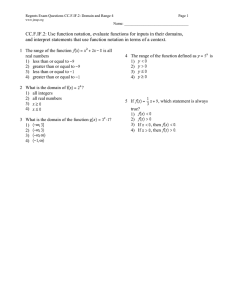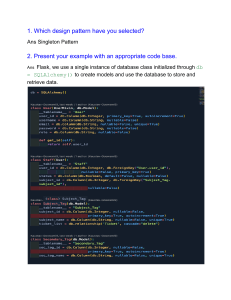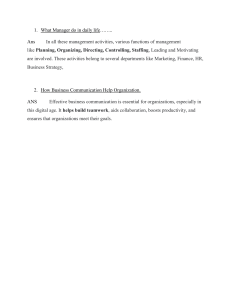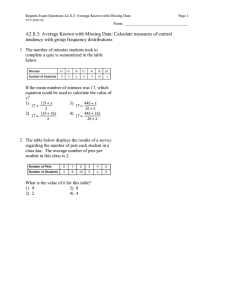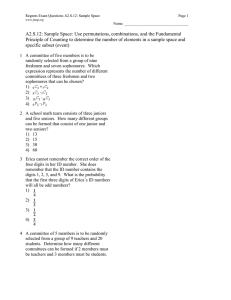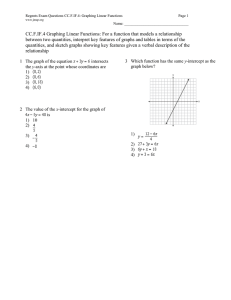Test Bank For Operations Management, 5th Edition by R. Dan Reid, Nada R. Sanders
advertisement
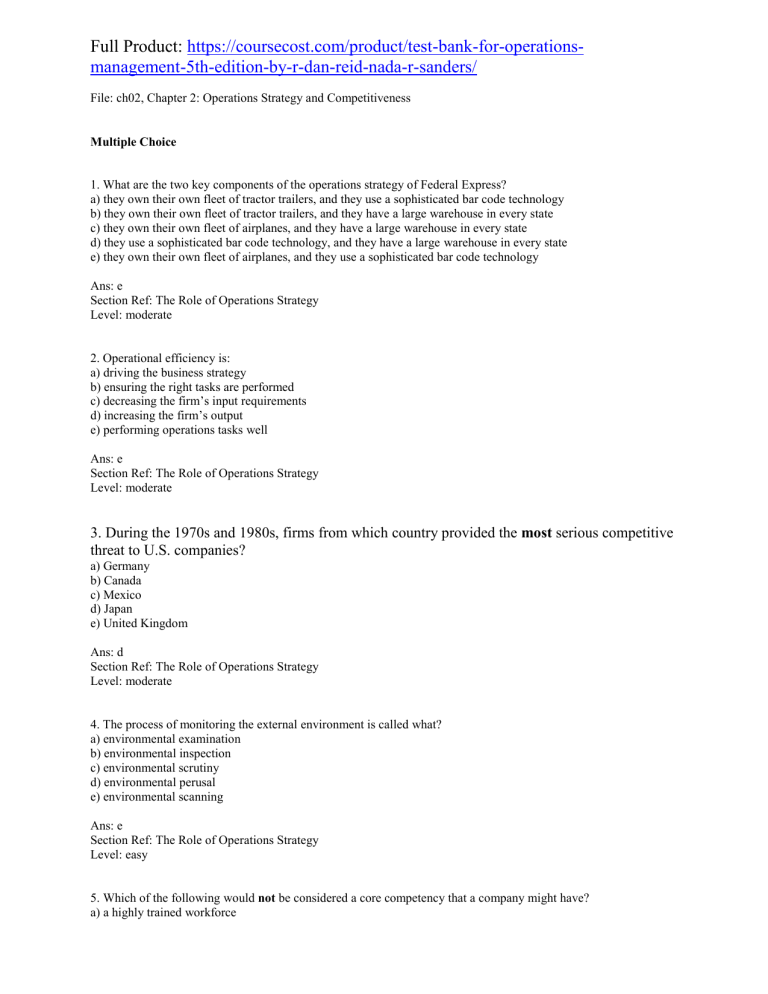
Full Product: https://coursecost.com/product/test-bank-for-operationsmanagement-5th-edition-by-r-dan-reid-nada-r-sanders/ File: ch02, Chapter 2: Operations Strategy and Competitiveness Multiple Choice 1. What are the two key components of the operations strategy of Federal Express? a) they own their own fleet of tractor trailers, and they use a sophisticated bar code technology b) they own their own fleet of tractor trailers, and they have a large warehouse in every state c) they own their own fleet of airplanes, and they have a large warehouse in every state d) they use a sophisticated bar code technology, and they have a large warehouse in every state e) they own their own fleet of airplanes, and they use a sophisticated bar code technology Ans: e Section Ref: The Role of Operations Strategy Level: moderate 2. Operational efficiency is: a) driving the business strategy b) ensuring the right tasks are performed c) decreasing the firm’s input requirements d) increasing the firm’s output e) performing operations tasks well Ans: e Section Ref: The Role of Operations Strategy Level: moderate 3. During the 1970s and 1980s, firms from which country provided the most serious competitive threat to U.S. companies? a) Germany b) Canada c) Mexico d) Japan e) United Kingdom Ans: d Section Ref: The Role of Operations Strategy Level: moderate 4. The process of monitoring the external environment is called what? a) environmental examination b) environmental inspection c) environmental scrutiny d) environmental perusal e) environmental scanning Ans: e Section Ref: The Role of Operations Strategy Level: easy 5. Which of the following would not be considered a core competency that a company might have? a) a highly trained workforce b) an inefficient distribution system c) skills in attracting and raising capital d) use of information technology e) quality control techniques Ans: b Section Ref: Developing a Business Strategy Level: easy 6. .Environmental scanning would not provide information on: a) sources of highly trained workers b) the firm’s internal inefficient distribution system c) opportunities and threats d) changes in information technology e) changes in global competition Ans: b Section Ref: Developing a Business Strategy Level: easy 7. Which of the following is not typically considered to be a core competency? a) workforce b) mission c) market understanding d) technology e) facilities Ans: b Section Ref: Developing a Business Strategy Level: moderate 8. What term describes the process of obtaining goods or services from an outside provider? a) outproviding b) transferization c) outsourcing d) subsourcing e) supersourcing Ans: c Section Ref: Developing a Business Strategy Level: easy 9. Once a business strategy has been developed: a) service prices are established b) competition must be identified c) an operations strategy must be formulated d) contracting with external sources must begin e) insourcing will be conducted Ans: c Section Ref: Developing a Business Strategy Level: easy 10. Which of the following is not considered one of the four broad categories of competitive priorities? a) technology b) cost c) quality d) flexibility e) time Ans: a Section Ref: Developing an Operations Strategy Level: easy 11. Which of the following competitive priorities typically requires the use of more general-purpose equipment? a) technology b) cost c) quality d) flexibility e) time Ans: d Section Ref: Developing an Operations Strategy Level: moderate 12. Highly-skilled hourly workers would be most needed by companies employing which of the following competitive priorities? a) location b) cost c) flexibility d) development speed e) time Ans: c Section Ref: Developing an Operations Strategy Level: hard 13. How does Federal Express maintain its ability to compete on time during peak demand periods? a) it subcontracts overload to other firms b) it purchases more planes c) overtime d) it uses a very flexible part-time workforce e) it purchases more vans Ans: d Section Ref: Developing an Operations Strategy Level: hard 14. When making competitive priority decisions the firm: a) must select the correct supply chain b) must ensure the PWP is correctly established c) must focus on the one competitive priority at the exclusion of all others d) must make trade-off decisions e) must isolate the competing internal departments Ans: d Section Ref: Developing an Operations Strategy Level: hard 15. Empire West displays what by specializing in making a wide variety of products? a) outsourcing b) SCM c) quality d) flexibility e) efficiency Ans: d Section Ref: Developing an Operations Strategy Level: moderate 16. Order winners and qualifiers: a) are consistent between manufacturing and service organizations b) only matter when responding to formal competitive bid requests c) remain constant over time d) change over time e) only apply to quasi-manufacturing firms Ans: d Section Ref: Developing an Operations Strategy Level: hard 17. Decisions regarding which of the following are not part of the production process infrastructure? a) organization of workers b) facilities c) worker pay d) quality control measures e) management policies Ans: b Section Ref: Developing an Operations Strategy Level: moderate 18. Decisions regarding which of the following are not part of the production process structure? a) management policies b) facilities c) robots d) flow of goods and services through the facility e) flexible manufacturing system (FMS) machines Ans: a Section Ref: Developing an Operations Strategy Level: moderate 19. What are the three primary types of technology? a) product technology, process technology, and information technology b) product technology, process technology, and environmental technology c) product technology, process technology, and safety technology d) information technology, environmental technology, and safety technology e) environmental technology, information technology, and process technology Ans: a Section Ref: Strategic Role of Technology Level: easy 20. Teflon is an example of what? a) process technology b) information technology c) environmental technology d) safety technology e) product technology Ans: e Section Ref: Strategic Role of Technology Level: moderate 21. Technology should be acquired because: a) the new technology is fun b) the new technology keeps the employees happy c) the new technology doesn’t cost very much d) the new technology always improves productivity e) the new technology supports the company’s chosen competitive priorities Ans: e Section Ref: Strategic Role of Technology Level: easy 22. Computer-aided manufacturing is an example of what? a) process technology b) information technology c) environmental technology d) safety technology e) product technology Ans: a Section Ref: Strategic Role of Technology Level: moderate 23. Which type of technology has had the greatest impact on business? a) process technology b) information technology c) environmental technology d) safety technology e) product technology Ans: b Section Ref: Strategic Role of Technology Level: moderate 24. When does productivity increase? a) inputs increase while outputs remain the same b) inputs decrease while outputs remain the same c) outputs decrease while inputs remain the same d) inputs and outputs increase proportionally e) none of the above Ans: b Section Ref: Strategic Role of Technology Level: moderate 25. Which of the following is a valid type of “productivity measure”? a) multi-output productivity measure b) partial productivity measure c) multi-part productivity measure d) multi-component productivity measure e) imperfect productivity measure Ans: b Section Ref: Productivity Level: moderate 26. Consider a pizza parlor. Which of the following would not be a valid productivity measure? a) pizzas produced / number of workers used b) pizzas produced / number of ovens c) pizzas produced / cost of workers and ingredients d) pizzas produced / cost of all inputs used e) labor hours / pizzas produced Ans: e Section Ref: Productivity Level: moderate 27. If inputs increase by 30% and outputs decrease by 15%, what is the percentage change in productivity? a) 100% decrease b) 11.54% increase c) 34.62% decrease d) 15% increase e) 15% decrease Ans: c Solution: P = O / I Section Ref: Productivity Level: hard 28. If inputs increase by 6% and outputs increase by 24%, what is the percentage productivity increase? a) 400.00% b) 16.98% c) 0.25% d) 4.00% e) 18.00% Ans: b Solution: P = O / I 1.24 / 1.06 = 1.1698 Section Ref: Productivity Level: hard Move the decimal over two to get your percentage 16.98% 29. An airline has determined that its baggage handlers handle 12,000 bags when 3 baggage handlers are on shift. What is the baggage handler productivity? a) 4,000 bags/shift b) 4,000 bags/handler c) 14,000 bags/shift d) 12,000 bags/shift e) 2,000 bags/handler Ans: b Solution: P = O / I 12000 / 3 = 4000 bags/handler Section Ref: Productivity Level: hard 30. If inputs increase by 10% and outputs increase by 4%, what is the percentage productivity increase? a) 5.45% b) 250.00% c) - 5.45% d) 5.77% e) - 5.77% Ans: c Solution: P = O / I 1.04 / 1.10 = .94 Since inputs were higher than outputs, this represents a loss or negative; Now, subtract 1.00 –. 94 = .06 .06 / 1.10 = -5.45 Section Ref: Productivity Level: hard 31. If inputs increase by 10% and outputs increase by 5%, what is the percentage change in productivity? a) 4.545% decrease b) 4.545% increase c) 4.762% increase d) 4.762% decrease e) 50.000% increase Ans: a Solution: P = O / I 1.05 / 1.10 = .95 Since inputs were higher than outputs, this represents a loss or negative; Now, subtract 1.00 –. 95 = .05 .05 / 1.10 = decrease 4.545% Section Ref: Productivity Level: hard 32. If Joe’s Diner serves 150 meals in one day using 3 kitchen staff, what is the kitchen staff daily productivity? a) 40 meals/staff b) 45 meals/staff c) 50 meals/staff d) 55 meals/staff e) 60 meals/staff Ans: c Solution: 150 / 3 = 50 meals per staff Section Ref: Productivity Level: moderate 33. If inputs increase by 30% and outputs increase by 15%, what is the percentage change in productivity? a) 50.00% decrease b) 88.46% increase c) 88.46% decrease d) 11.54% increase e) 11.54% decrease Ans: e Solution: 1.15 / 1.30 = .8846 Since inputs were higher than outputs; this represents a loss or negative Now, subtract 1.00 –. 8846 = .1154 decrease 11.54% Section Ref: Productivity Level: hard 34. Suppose that on Monday the cost of inputs sums to $1000, and the value of outputs sums to $4000. For which of the following values on Tuesday would productivity increase? a) inputs = $1100, outputs = $4000 b) inputs = $1100, outputs = $4200 c) inputs = $850, outputs = $3600 d) inputs = $1000, outputs = $3900 e) inputs = $2000, outputs = $8000 Ans: c Solution: Calculate the P= O/I for each; c is the only one higher than Monday. 3600 / 850 = 4.23 Section Ref: Productivity Level: moderate 35. Suppose that a plant has a daily productivity of 200 parts per employee? What can we conclude? a) the daily productivity is excellent b) the plant can hire more workers and still earn profits c) the plant is not earning profits d) the plant must be highly automated e) nothing Ans: e Section Ref: Productivity Level: moderate 36. Suppose that a plant has a daily productivity of 0.85 parts per employee? What can we conclude? a) the plant must be very labor-intensive b) the plant is not earning profits c) the plant must be highly automated d) the plant should lay off workers e) nothing Ans: e Section Ref: Productivity Level: moderate 37. Suppose that a plant has a total productivity measure of 0.85. What can we conclude? a) the plant is not earning profits b) nothing c) the plant should lay off workers d) the plant is highly automated e) the daily productivity is excellent Ans: a Section Ref: Productivity Level: moderate 38. Suppose that last month the cost of inputs summed to $100,000, and the value of outputs summed to $800,000. For which of the following values this month would productivity increase? a) inputs = $110,000, outputs = $800,000 b) inputs = $50,000, outputs = $400,000 c) inputs = $200,000, outputs = $1,600,000 d) inputs = $100,000, outputs = $820,000 e) inputs = $300,000, outputs = $1,600,000 Ans: d Solution: Calculate the P= O/I for each; d is the only one higher than last month. 820,000 / 100,000 = 8 Section Ref: Productivity Level: moderate 39. Suppose that in week 1 a company produced 1000 units using 60 labor hours. For which of the following values in week 2 would labor productivity decrease? a) units = 2000, hours = 120 b) units = 1500, hours = 95 c) units = 1000, hours = 58 d) units = 500, hours = 30 e) units = 2000, hours = 100 Ans: b Solution: Calculate the P= O/I for each; b has the lowest productivity. 1500 / 95 = 15.79 Section Ref: Productivity Level: moderate 40. Suppose that on Wednesday the cost of inputs summed to $4000, and the value of outputs summed to $10,000. For which of the following values on Thursday will productivity stay the same? a) inputs = $2000, outputs = $5000 b) inputs = $5000, outputs = $10,000 c) inputs = $4000, outputs = $8000 d) inputs = $10,000, outputs = $4000 e) inputs = $12,000, outputs = $40,000 Ans: a Solution: Calculate the P= O/I for each; 5000 / 2000 = 2.5 a is the only one equal to Wednesday’s. Section Ref: Productivity Level: moderate 41. Vericol, Inc. manufactures drugs using workers and automated machines. The firm has decided to replace two workers with a new machine, while the output per day is not expected to change. Which of the following cannot be true? a) labor productivity will increase b) machine productivity will decrease c) labor productivity will decrease d) multifactor productivity will increase e) multifactor productivity will decrease Ans: c Section Ref: Productivity Level: moderate 42. A manager has just replaced three workers with a machine that is cheaper to operate than the cost of the three replaced workers. Output is expected to remain the same. Which of the following is true? a) labor productivity will decrease b) machine productivity will increase c) multifactor productivity will decrease d) multifactor productivity will increase e) the value of output will decrease Ans: d Section Ref: Productivity Level: moderate 43. Suppose that in January a company produced 5000 units using 1000 labor hours. For which of the following values in February would labor productivity decrease? a) units = 5000, hours = 900 b) units = 10,000, hours = 1500 c) units = 10,000, hours = 2000 d) units = 2500, hours = 500 e) units = 5000, hours = 1100 Ans: e Solution: Calculate the P= O/I for each; e is the only one less than January. 5000 / 1100 = 4.54 Section Ref: Productivity Level: moderate 44. Suppose that in year 1 a company produced $100 Million worth of outputs while inputs totaled $50 Million. For which of the following values in year 2 would productivity decrease? a) outputs = $90 Million, inputs = $50 Million b) outputs = $400 Million, inputs = $200 Million c) outputs = $250 Million, inputs = $100 Million d) outputs = $50 Million, inputs = $25 Million e) outputs = $60 Million, inputs = $25 Million Ans: a Solution: Calculate the P= O/I for each; 90 / 50 = 1.8 a is the only one less than Year 2. Section Ref: Productivity Level: moderate 45. If the telecommunication company sold $10,000,000 of internet service using $50,000 of labor, $25,000 of leased bandwidth, $45,000 service fees, and $80,000 or replacement parts, what is the telecommunication multifactor productivity? a) 35 b) 40 c) 45 d) 50 e) 55 Ans: d Solution: 10,000,000 / 50k + 25k + 45k + 80k = 10,000,000 / 200k = 50 Section Ref: Productivity Level: moderate 46. Suppose that on Thursday a company produced 80 units using 160 labor hours. For which of the following values on Friday would daily labor productivity increase? a) units = 70, hours = 160 b) units = 80, hours = 180 c) units = 240, hours = 500 d) units = 160, hours = 300 e) units = 40, hours = 100 Ans: d Solution: Calculate the P= O/I for each; d is the only one more than Thursday. 160 / 300 = .5333 Section Ref: Productivity Level: moderate 47. A firm produces 100 units using 800 labor hours. What is its labor productivity? a) 0.125 units/hour b) 8 units/hour c) 100 units/hour d) 800 units/hour e) -0.125 units/hour Ans: a Solution: 100 / 800 = .125 units / hr Section Ref: Productivity Level: easy 48 A firm produces 2000 products using 10 workers on an eight-hour shift. What is the labor productivity per worker? a) 200 units/hour b) 25 units/hour c) 250 units/hour d) 20 units/hour e) 0.04 units/hour Ans: b Solution: 2000 / 10 = 200 = 200/8 = 25 units/hr Section Ref: Productivity Level: moderate 49. A machine shop produces metal frames on two different machines. The average daily production on machine 1 is 300 frames, and the average daily production on machine 2 is 180 frames. What is the daily machine productivity? a) 480 frames/machine b) 330 frames/machine c) 240 frames/machine d) 160 frames/machine e) 300 frames/machine Ans: c Solution: 300 + 180 = 480 Section Ref: Productivity Level: easy 480 / 2 = 240 frames/machines 50. A machine shop produces metal brackets on two different machines. Machine 1 can produce a bracket every 10 minutes. Machine 2 can produce a bracket every 4 minutes. What is the average productivity per machine? a) 4.3 brackets/hour b) 8.6 brackets/hour c) 10.5 brackets/hour d) 21.0 brackets/hour e) 7.0 brackets/hour Ans: c Solution: Machine 1 > 6 [6x10=1 hr] Machine 2 > 15[4x15=1 hr] 6 + 15 = 21 = 21 / 2 = 10.5 brackets/hr Section Ref: Productivity Level: hard 51. A firm produces handbags using three workers. On Tuesday, Jane completed 60 bags in 6 hours, Ron completed 50 bags in 7 hours, and Mary completed 80 bags in 5 hours. What was the overall productivity of the firm? a) 7.92 bags/hour b) 11.05 bags/hour c) 10.00 bags/hour d) 10.56 bags/hour e) 61.67 bags/hour Ans: d Solution: Jane 60 bags 6 hrs Ron 50 bags 7 hrs Mary 80 bags 5 hrs Total - 190 bags 18 hrs 190 / 18 = 10.56 bags/hr Section Ref: Productivity Level: moderate 52. Suppose that output is worth $400, and labor and materials costs are $200 and $100, respectively. What is the materials productivity? a) 2.00 b) 1.33 c) 0.25 d) 0.75 e) 4.00 Ans: e Solution: 400 / 100 = 4.00 Section Ref: Productivity Level: easy 53. A firm produces 500 units per day using five workers on a five-hour shift. On average, 15% of the units produced are defective and must be scrapped. What is the labor productivity for nondefective units? a) 17 units/hour b) 3 units/hour c) 20 units/hour d) 85 units/hour e) 15 units/hour Ans: a Solution: 500 per day – 15% or 75 = 425 per day 425 / 5 workers = 85 85 / 5 hr = 17 units / hr Section Ref: Productivity Level: moderate 54. Suppose that weekly output is worth $1000, and labor and materials costs are $300 and $200, respectively. What is the multifactor productivity ratio? a) 1000 b) 8 c) 2 d) 3 e) 0.5 Ans: c Solution: 1000 / 300 + 200 = 1000 / 500 = 2 Section Ref: Productivity Level: moderate 55. Each day a firm produces 50 products worth $40 each. Raw materials cost per unit are $12. The firm uses 4 workers on an eight-hour shift earning $10 per hour each. What is the multifactor productivity ratio? a) 1.82 b) 0.77 c) 3.16 d) 0.12 e) 2.17 Ans: e Solution: 50 x $40 = 2000 600 [12x50] + 320 = 920 2000 / 920 = 2.17 Section Ref: Productivity Level: moderate 56. A bakery bakes bread in two different ovens. Oven 1 can bake a loaf every 30 minutes. Oven 2 can bake a loaf every 15 minutes. What is the average productivity per oven? a) 6.00 loaves/hour b) 3.00 loaves/hour c) 2.67 loaves/hour d) 1.33 loaves/hour e) 0.38 loaves/hour Ans: b Solution: Oven 1 can bake 2 per hour Oven 2 can bake 4 per hour Total 6 loaves per hr / 2 ovens = 3 loaves per hour Section Ref: Productivity Level: hard 57. Johnny employs five painters. He collected the following data from last week. Painter Hours Walls Completed Julius 40 60 1.5 Margaret 32 68 2.125 Dave 50 78 1.56 Suzy 36 70 1.94 Fawn 44 74 1.68 Which painter was least productive last week? a) Julius b) Margaret c) Dave d) Suzy e) Fawn Ans: a Solution: Calculate by dividing walls completed by the hours; a is the lowest and least productive Painter Hours Walls Completed Julius 40 60 1.5 Margaret Dave Suzy Fawn 32 50 36 44 68 78 70 74 2.125 1.56 1.94 1.68 Section Ref: Productivity Level: moderate 58. A bakery uses five ovens to bake muffins. Yesterday’s data are provided below. Oven Hours Muffins Baked Oven 1 5 600 120 Oven 2 10 1500 150 Oven 3 8 1280 160 Oven 4 8 800 100 Oven 5 6 780 130 Which oven was the most productive? a) Oven 1 b) Oven 2 c) Oven 3 d) Oven 4 e) Oven 5 Ans: c Solution: Calculate by dividing muffins baked by the hours; c is the highest and most productive Oven 1 5 600 120 Oven 2 10 1500 150 Oven 3 8 1280 160 Oven 4 8 800 100 Oven 5 6 780 130 Section Ref: Productivity Level: moderate 59. The state government utilizes five workers to stamp license plates. Last month’s data are provided below. Worker Days Worked Units Stamped Pete 30 1440 48 Tommy 20 1600 80 Laura 24 2000 83.33 Julie 28 2100 75 Susan 29 1200 41.38 Which worker was the least productive? a) Pete b) Tommy c) Laura d) Julie e) Susan Ans: e Solution: Calculate by dividing units stamped by the days; e is the lowest and least productive Worker Days Worked Units Stamped Pete 30 1440 48 Tommy 20 1600 80 Laura 24 2000 83.33 Julie 28 2100 75 Susan 29 1200 41.38 Section Ref: Productivity Level: moderate 60. A firm uses five plants to produce its products. Each final product has a value of $100. The following table provides last week’s output, labor hours used (at $15 per hour), and materials cost per unit. Plant Output Labor Hours Plant 1 2000 400 Plant 2 5000 900 Plant 3 9000 2000 Plant 4 1000 150 Plant 5 2000 440 Which plant was most productive last week? a) plant 1 b) plant 2 c) plant 3 d) plant 4 e) plant 5 Materials Cost per Unit $20 $18 $20 $30 $18 Ans: b Solution Plant 1 2000/(400x15) + (20x2000) = .043 Plant 2 5000/(900x15) + (18x2000) = .048 Plant 3 9000/(2000x15) + (20x2000) = .042 Plant 4 1000/(150x15) + (30x2000) = .031 Plant 5 2000/(440x15) + (18x2000) = .047 Section Ref: Productivity Level: hard 61. A firm uses five plants to produce its products. Output value and total input cost for last week are provided below. Plant 1 Output Value Total Cost Plant 1 $20,000 $25,000 Plant 2 $50,000 $60,000 Plant 3 $40,000 $42,000 Plant 4 $80,000 $99,000 Plant 5 $25,000 $29,000 Which plant was least productive last week? a) plant 1 b) plant 2 c) plant 3 d) plant 4 e) plant 5 Ans: a Solution: Plant 1 20000/25000 = .800 Plant 2 50000/60000 = .833 Plant 3 40000/42000 = .952 Plant 4 80000/99000 = .808 Plant 5 25000/29000 = .862 Section Ref: Productivity Level: moderate 62. Last week Jason painted 11 houses in 4 days. This week he painted 14 houses in 5 days. What was his percent productivity increase? a) 1.82% b) 1.79% c) 27.27% d) 25.00% e) 5.00% Ans: a Solution: 11 / 4 = 2.75 14 / 5 = 2.8 2.8 / 2.75 = 1.01818 or 1.82% (remember to move the decimal over) Section Ref: Productivity Level: moderate 63. Last month a plant produced 10,000 units using 2000 labor hours. This month it produced 12,000 units using 3000 labor hours. What is the percent productivity decrease? a) 200% b) 100% c) 50% d) 25% e) 20% Ans: e Solution: 10000 / 2000 = 5 12000 / 3000 = 4 4 /5 = .8 or 20% Section Ref: Productivity Level: moderate 64. On Tuesday George produced 100 units in 8 hours. On Wednesday he produced 120 units in 10 hours. What was his percent productivity change? a) 0.50% b) 4.17% c) 4.17% d) 4.00% e) 4.00% Ans: d Solution: 100 / 8 = 12.5 120 / 10 = 12 12 / 12.5 = .96 or -4% Section Ref: Productivity Level: moderate 65. Last month Stacy sold 10 houses while working 20 days. This month she sold the same number of houses in 22 days. What is her percent productivity change? a) 10.00% b) 9.09% c) 9.09% d) 10.00% e) 4.55% Ans: b Solution: 10 / 20 = .5 10 / 22 = .4545 .4545 / .5 = -.9090 or – 9.09% Section Ref: Productivity Level: moderate 66. Yesterday, John produced 100 units in 8 hours. Today he produced the same amount in 6 hours. What is his percent productivity change? a) 33.33% b) 0.00% c) 25.55% d) 25.00% e) 4.67% Ans: a Solution: 100 / 8 = 12.5 100 / 6 = 16.666 16.666 / 12.5 = 1.3333 or 33.33% Section Ref: Productivity Level: moderate 67. A company used to produce 500 units every 2 days, but 10% of the units were defective. After installing a new process, defects have been eliminated while output has remained the same. What is the percent increase in productivity due to installing the new process? a) 10.00% b) 25.00% c) 11.11% d) 0.00% e) 5.56% Ans: c Solution: 10% of 500 = 450 450 / 2 = 225 500/2 = 250 250 / 225 = 1.1111 or 11.11% Section Ref: Productivity Level: hard 68. A company used to produce 300 units every day, but 20% of the units were defective. After installing a new process, the defect rate has been reduced to 5%, while output has remained the same. What is the percent increase in productivity due to installing the new process? a) 15.79% b) 0.00% c) 15.00% d) 18.75% e) 75.00% Ans: d Solution: 300 – 20% = 240 300 – 5% = 285 285 / 240 = 1.1875 or 18.75% Section Ref: Productivity Level: hard 69. Last month a plant produced 1200 units using 150 labor hours. This month it produced 1500 units using 300 labor hours. What is the percent productivity decrease? a) 37.50% b) 60.00% c) 100.00% d) 300.00% e) 200.00% Ans: a Solution: 1200 / 150 = 8 1500 / 300 = 5 5/ 8 = .625 100 – 62.5 = 37.50% Section Ref: Productivity Level: moderate 70. Which of the following has used the Internet to conduct a fashion show in order to boost sales? a) The Gap b) Eddie Bauer c) Fruit of the Loom d) Victoria’s Secret e) Sears Ans: d Section Ref: Developing a Business Strategy Level: hard 71. Which of the following is not described in the chapter as one of the major environmental trends that firms should monitor? a) marketplace trends b) global climate trends c) economic trends d) political trends e) social trends Ans: b Section Ref: Developing a Business Strategy Level: hard 72. Suppose that a plant manager is only evaluated based on the partial productivity measure: output/(number of employees). If she replaces 10% of the workforce with robots (one robot per replaced worker), and output remains the same, what will be the percent change in this measure of productivity? Ans: 11.1% increase Section Ref: Productivity Level: hard 73. Productivity is essentially: a) something to fill out managers’ reports b) measure of resource effectiveness c) a scorecard of how efficiently resources are used d) a balance scorecard metric e) the current business fad Ans: c Section Ref: Productivity Level: hard True/False 74. An operations strategy covers a relatively short time horizon, whereas a business strategy covers a relatively long time horizon. Ans: False Section Ref: The Role of Operations Strategy Level: easy 75. To provide speed of delivery, Federal Express invested in a sophisticated bar code technology. Ans: False Section Ref: The Role of Operations Strategy Level: hard 76. To provide dependability of delivery, Federal Express acquired its own fleet of airplanes. Ans: False Section Ref: The Role of Operations Strategy Level: hard 77. Operations Strategy is developed before the business strategy so the company knows what it will be producing before establishing a long range business strategy. Ans: False Section Ref: The Role of Operations Strategy Level: hard 78. Victoria’s Secret has used the Internet to conduct a fashion show in order to boost sales. Ans: True Section Ref: Developing a Business Strategy Level: hard 79. Market research represents a type of environmental scanning. Ans: True Section Ref: Developing a Business Strategy Level: moderate 80. Companies that compete on cost generally also allow a lot of product customization. Ans: False Section Ref: Developing a Business Strategy Level: moderate 81. Firms that focus on quality as their primary competitive priority usually implement either product design quality or process quality, but not both. Ans: False Section Ref: Developing an Operations Strategy Level: moderate 82. Federal Express subcontracts its work overload to other firms during peak demand periods. Ans: False Section Ref: Developing an Operations Strategy Level: hard 83. As long as the firm always meets the order qualifier classification it will be always be competitive and win competitive bid opportunities Ans: False Section Ref: Developing an Operations Strategy Level: moderate 84. Companies that compete based on flexibility often cannot compete on cost. Ans: True Section Ref: Developing an Operations Strategy Level: moderate 85. Facilities decisions are part of the production process infrastructure. Ans: False Section Ref: Developing an Operations Strategy Level: moderate 86. Decisions regarding flow of goods and services through the facility are part of the production process structure. Ans: True Section Ref: Developing an Operations Strategy Level: moderate 87. Worker pay decisions are part of the production process structure. Ans: False Section Ref: Developing an Operations Strategy Level: moderate 88. Quality control approaches are part of the production process infrastructure. Ans: True Section Ref: Developing an Operations Strategy Level: moderate 89. Studies have shown that companies that invest in new technologies tend to improve their financial position over those that do not. Ans: True Section Ref: Developing an Operations Strategy Level: moderate 90. Operations management is only concerned with information technology applications within the firm. Ans: False Section Ref: Strategic Role of Technology Level: moderate 91. Process technology is the technology that has grown the most rapidly and has had the greatest impact on business. Ans: False Section Ref: Strategic Role of Technology Level: moderate 92. A measure of how efficiently inputs are being converted into outputs is called utilization. Ans: False Section Ref: Strategic Role of Technology Level: moderate 93. Productivity = input/output. Ans: False Section Ref: Productivity Level: easy 94. Output/(all inputs used) is called total productivity. Ans: True Section Ref: Productivity Level moderate 95. An operations strategy should not impact the firm’s supply chain design. Ans: False Section Ref: Operations Strategy Within OM: How It All Fits Together Level moderate 96. Output/(labor + capital) is an example of a partial productivity measure. Ans: False Section Ref: Productivity Level: moderate 97. Productivity gains in the service sector have been much lower than that of manufacturing. Ans: True Section Ref: Productivity Level: moderate 98. A Marketing Strategy is defines marketing plans to support the business strategy. Ans: True Section Ref: The Role of Operations Strategy Level: easy 99. McDonald’s and Pizzerias compete on the same “order winners”. Ans: False; McDonalds competes on consistency, Pizzerias compete on homemade taste. Section Ref: Developing an Operations Strategy Level: easy 100. A nation’s productivity is not directly related to its standard of living. Ans: False Section Ref: Productivity Level: moderate Essay 101. Describe the difference between operational effectiveness and strategy. Ans: Operational effectiveness is the ability to perform operations more efficiently than competitors. Strategy, on the other hand, is a plan for competing in the marketplace. Section Ref: The Role of Operations Strategy Level: moderate 102. Define “environmental scanning.” Ans: Monitoring the external environment for changes and trends in the market, in the economic and political environment, and in society in order to determine business opportunities and threats. Section Ref: The Role of Operations Strategy Level: moderate 103. A mission statement answers what three overriding questions? Ans: (1) What business is the organization in?, (2) Who are the customers?, (3) How will the company’s core beliefs shape its business? Section Ref: The Role of Operations Strategy Level: moderate 104. What are some general technological trends in the marketplace? Ans: point-of-sale scanners, automation, computer-assisted processing, electronic purchasing, electronic order tracking, and e-commerce Section Ref: The Role of Operations Strategy Level: moderate 105. How have U.S. tobacco companies responded to public awareness of the dangers of smoking? Ans: Many have changed their strategy to focus on customers overseas where smoking is still socially acceptable, or have diversified into other product lines. Section Ref: Developing a Business Strategy Level: moderate 106. Discuss how the operation strategy categories of structure and infrastructure determine the nature of the company’s operations function. Ans: Structure is the operations decisions related to the design of the production process while infrastructure is operations decisions related to the planning and control systems of the operations. Together they define how the firm will pursue its long range plan. Section Ref: Developing a Business Strategy Level: moderate 107. Suggest some core competencies that companies may have. Ans: highly trained workforce, responsive in meeting customer needs, flexible in performing a variety of tasks, strong technical capability, creative in product design, flexible in producing a variety of products, technologically advanced, an efficient distribution system, skilled in understanding customer wants and predicting market trends, skilled in attracting and raising capital, use of latest production technology, use of information technology, and quality control techniques. Section Ref: Developing a Business Strategy Level: moderate 108. What is management guru Tom Peters’ famous quote regarding outsourcing? What is his main point? Ans: “Do what you do best and outsource the rest.” The point is to outsource non-core activities so that the firm can focus on its core competencies. Section Ref: Developing a Business Strategy Level: hard 109. What outsourcing activities does Total Logistics Control perform for Meijer? Ans: all deliveries, route scheduling, and all activities involved in maintaining a fleet of trucks Section Ref: Developing a Business Strategy Level: hard 110. At the national level why is it important to measure productivity? Ans: The economic success of a nation and the quality of life of its citizens are related to the competitiveness in the global marketplace. Understanding the nation’s productivity helps to define how the nation is performing as a whole/ Section Ref: Developing an Operations Strategy Level: hard 111. Describe how Southwest Airlines competes on cost. Ans: Facilities are streamlined: only one type of aircraft is used, and flight routes are generally short. This serves to minimize costs of scheduling crew changes, maintenance, inventories of parts, and many administrative costs. Unnecessary costs are completely eliminated: there are no meals, printed boarding passes, or seat assignments. Section Ref: Developing a Business Strategy Level: moderate 112. For what entities can productivity be measured? Ans: individuals, departments, organizations, industries, or even countries Section Ref: Productivity Level: moderate Fill-in-the-Blank 113. If a company’s inputs for producing a certain product increase by 10% and the output increases by 25%, what is the percentage productivity increase for that product? Ans: 13.6% Section Ref: Productivity Level: hard 114. If a company’s inputs for producing a certain product increase by 50% and the output increases by 90%, what is the percentage productivity increase for that product? Ans: 26.7% Section Ref: Productivity Level: hard 115. The school’s cafeteria has three service lines (pizza, salads, and sandwiches). The pizza line has one server and serves 90 pizzas per hour. The salad line has two servers and they handle 140 customers in 70 minutes. The sandwich line has three servers and they supply 360 sandwiches in 90 minutes. Which service line has the highest hourly productivity? Ans: Pizza line at 90 pizzas/server/hour Section Ref: Productivity Level: hard 116. A new milling machine can process 2000 jobs in 8 hours. What is the productivity of the machine? Ans: 250 jobs/hour Section Ref: Productivity Level: easy 117. A firm produces 6000 products using 12 workers on a nine-hour shift. What is the labor productivity per worker? Ans: 55.6 units/hour Section Ref: Productivity Level: moderate 118. A machine shop produces hangers on two different machines. Machine 1 can produce a hanger every 15 minutes. Machine 2 can produce a hanger every 10 minutes. What is the average productivity per machine? Ans: 5 units/hour Section Ref: Productivity Level: hard 119. A firm produces shirts using three workers. On Wednesday, Madeline completed 110 shirts in 6 hours, Federico completed 90 shirts in 7 hours, and Susan completed 130 shirts in 9 hours. What was the overall productivity of the firm? Ans: 15 units/hour Section Ref: Productivity Level: moderate 120. A firm produces 1500 units per day using four workers on a five-hour shift. On average, 12% of the units produced are defective and must be scrapped. What is the labor productivity for non-defective units? Ans: 66 units/hour Section Ref: Productivity Level: moderate 121. Last week George mowed 6 lawns in two days. This week he mowed 8 lawns in three days. In which week was George more productive? Ans: last week Section Ref: Productivity Level: moderate 122. During week one, on average, the aircraft cleaning staff was able to totally clean an airplane in 45 minutes using 3 cleaners. During week two the average time to clean an aircraft went to 40 minutes with one of the cleaning staff off sick. Week two productivity changed in which direction and by how much? Ans: Week two productivity is 20 minutes/staff, productivity decreased Section Ref: Productivity Level: moderate 123. A company uses two plants to produce motorcycles. Plant A produces 200 per week using 20 workers and 4 machines. Plant B produces 250 per week using 10 workers and 10 machines. Which plant is more productive? Ans: unknown—Plant A has a higher machine productivity but a lower labor productivity. The cost of labor and machines is needed. Section Ref: Productivity Level: moderate 124. Firms measure productivity to learn how ________________________ they are. Ans: competitive Section Ref: Developing an Operations Strategy Level: moderate 125. Rapid technological change includes the risk of ________________________ . Ans: obsolescence. Section Ref: Strategic Role of Technology Level: moderate 126. The operations function must place emphasis on those priorities that directly support the __________ ________. Therefore, it needs to make _________ between different priorities. Ans: Business strategy, trade-offs Section Ref: Developing an Operations Strategy Level: moderate 127. Estimating productivity requires measurements of ________________________ and ________________________. Ans: results and effort; output and input, etc. Section Ref: Productivity Level: moderate 128. Operations strategy is a long range plan for the design and use of resources in support of ________________________ Ans: the business strategy Section Ref: The Role of Operations Strategy Level: easy 129. Mass produced standard products were the main manufacturing concern until ________________________. Ans: the 1970s Section Ref: The Role of Operations Strategy Level: easy 130. Restaurants that offer pizza to go have different ________________________ than those that do not. Ans: missions Section Ref: The Role of Operations Strategy Level: easy 131. __________ ________ is used to improve the process of creating goods and services. Ans: Process technology Section Ref: Strategic Role of Technology Level: easy 132. Environmental scanning helps organizations recognize ________________________. Ans: opportunities and threats. Section Ref: Developing a Business Strategy Level: easy 133. Firms use ________________________ to concentrate on their ________________________. Ans: outsourcing, core competencies Section Ref: Developing a Business Strategy Level: easy 134. A business strategy is like an explorer's ________________________. Ans: compass Section Ref: Developing a Business Strategy Level: easy 135. Saying that an organization is qualified to be in its marker means it has the right ______________________. Ans: order qualifiers Section Ref: Developing a Business Strategy Level: easy 136. ____________ _______________ develops financial plans to support the business strategy. Ans: Finance Strategy Sections Ref: The Role of Operations Strategy Level: easy
